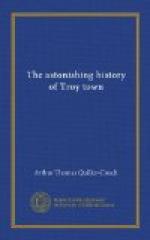Mr. Fogo, though the words were not spoken to him, winced and turned to stare abstractedly at the river.
“Sir,” said Caleb from his hammock that night, “cudn’ ’ee put in a coddysel?”
“A codicil?”
“Iss, just to say, ’No wimmen allowed but Tamsin Dearlove—us don’t mind she.’ Wudn’ that do, sir?”
“I’m afraid not, Caleb. By-the-bye, how does your Notice run? ‘All women found trespassing will be—’”
“Dealt wi’ ‘cordin’ to the law, sir.”
“Dear me, Caleb!” murmured Mr. Fogo, “but I trust that under no circumstances should I deal with a woman otherwise than according to the law.”
CHAPTER IX.
OF A TOWN THAT WOULD LAUGH AT THE GREAT. AND HOW A DULL COMPANY WAS CURED BY AN IRISH SONG.
We left the Misses Buzza engaged in rowing their papa homewards. The Three Queens as they steered King Arthur to Avilion can have been no sadder pageant. It is true the Misses Buzza grieved for no Excalibur, but the Admiral had lost his cocked-hat.
Picture to yourself that procession: the journey past the jetties; the faces that grinned down from overhanging hulls, or looked out hurriedly at casements and grew pale; the blue-jerseyed Trojan lounging on the quay, and pausing in his whistle to stare; the Trojan maidens gazing, with arrested needle; the shipwrights dropping mallet and tar-pot; the ferrymen resting on their oars; the makers of ship’s biscuit rushing out, with aprons flying, to see the sight; the butcher, the baker, the candle-stick maker—each and all agog. Then imagine the Olympian mirth that ran along the waterside when Troy saw the joke, and, hand on hip, laughed with all its lungs.
But even this was not the worst: no, nor the crowd of urchins that followed from the landing-stage and cheered at intervals. It was when Admiral Buzza looked up and spied the face of Mrs. Goodwyn-Sandys at an upper window of “The Bower,” that the cup of his humiliation indeed brimmed over.
Mrs. Buzza, “tittivating” at the mirror, heard the stir, and, presentient of evil, rushed down-stairs. She saw her lord restored to her, dear but damp. Yet she “nor swooned, nor uttered cry:” she simply sat violently and suddenly down upon the hall-chair, and piteously stared.
“Emily, get up!”
She did so.
“You are wet, my love,” she ventured timorously.
“Wet! Woman, is this the time for airy persiflage?”
“My love,” replied Mrs. Buzza, meekly, “nothing was further from my thoughts.”
The Admiral glared upon her for a moment, but the retort died upon his lips. He flung his hands out with an appealing gesture and something like a sob.
“Emily,” he cried, hoarsely, “Troy has laughed at me again. Put me to bed.”
O forgiving heart of woman! In a moment her arms were about him, and her tears mingling with the general dampness of the Admiral’s costume. Then, having wept her fill, she smiled a little, dried her eyes, and put the Admiral to bed.




